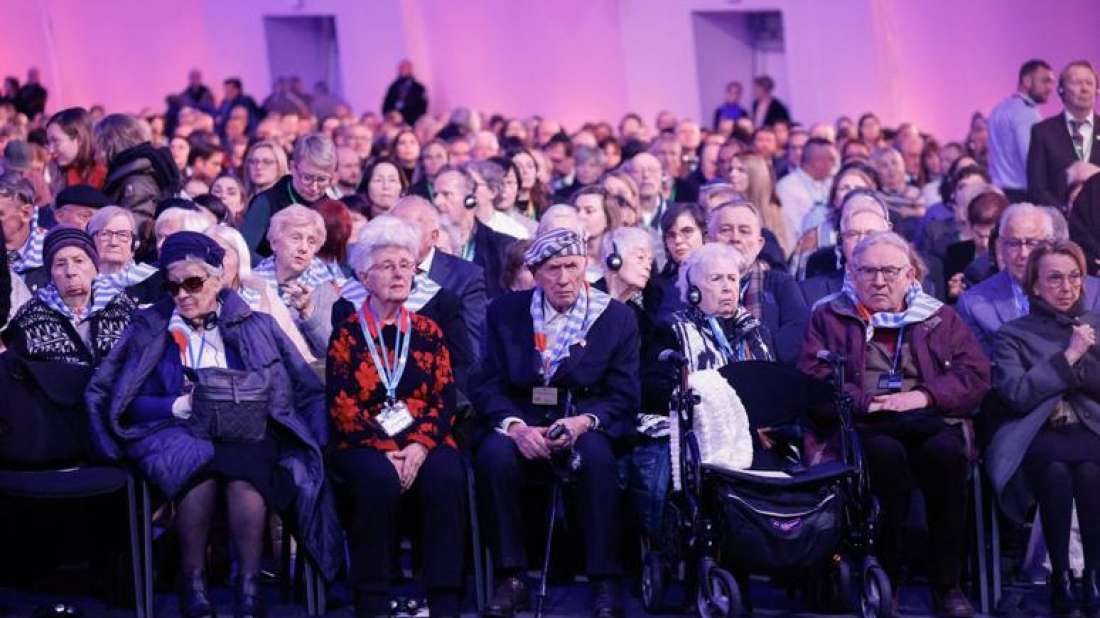live Trump says U.S. has enough weapons to fight wars 'forever': All the latest news on the Iran strikes
U.S. President Donald Trump said the U.S. military has enough stockpiled weapons to fight wars 'forever' in a so...

Holocaust survivors gathered on Monday to commemorate the 80th anniversary of the liberation of Auschwitz, the infamous Nazi concentration camp where over 1.1 million people, mostly Jews, were systematically murdered.
The solemn ceremony took place at the former camp site in Poland, which was initially established by Nazi Germany as a forced labor camp before becoming a central hub in the regime's genocidal machinery. Victims perished in gas chambers, or succumbed to starvation, disease, and freezing conditions.
The event was attended by prominent global leaders, including German Chancellor Olaf Scholz, Ukrainian President Volodymyr Zelenskiy, Britain's King Charles, French President Emmanuel Macron, and Polish President Andrzej Duda. Rather than delivering speeches, the leaders chose to listen to survivors who bore witness to one of humanity’s darkest chapters.
Survivors used the occasion to warn of the dangers of rising antisemitism and intolerance. Leon Weintraub, a 99-year-old retired physician who was sent to Auschwitz in 1944, expressed his anguish at the resurgence of far-right rhetoric across Europe.
"It grieves me deeply to see in many European countries, but also in Poland, Nazi-style uniforms and slogans openly paraded at marches. It grieves me to see this happening without any consequences," Weintraub said. "These people proclaim themselves as nationalists, but at the same time they proclaim the hateful ideology of German Nazis—an ideology that murdered millions under the swastika."
King Charles, who visited a Jewish Community Center in Krakow before the ceremony, stressed the importance of preserving the memory of the Holocaust. "The act of remembering the evils of the past remains a vital task, and in so doing, we inform our present and shape our future," he said.
The remembrance of Nazi crimes has become increasingly politicized in recent years, fueled by the rise of far-right parties across Europe. On Saturday, controversy erupted after billionaire Elon Musk delivered a video address to supporters of Germany’s far-right Alternative für Deutschland (AfD) party, which is currently polling second ahead of the February 23 elections.
In his remarks, Musk appeared to downplay Germany’s historical responsibility for the Holocaust. "I think there's, like, frankly, too much of a focus on past guilt. And we need to move beyond that," he said.
The rally drew sharp criticism, with Polish Prime Minister Donald Tusk warning that the rhetoric was disturbingly reminiscent of Nazi-era propaganda. "The words we heard from the main actors of the AfD rally about 'Great Germany' and 'the need to forget German guilt for Nazi crimes' sounded all too familiar and ominous," Tusk said.
As survivors gathered to share their stories one last time, their message was clear: the lessons of Auschwitz must not be forgotten, especially in an era of rising intolerance and revisionism
The Kremlin is utilising the recent United States and Israeli military strikes on Iran to validate its ongoing war in Ukraine. Russian officials are pointing to the escalation in the Middle East as evidence that Western nations do not adhere to international rules.
Saudi Arabia’s state oil giant Saudi Aramco closed its Ras Tanura refinery on Monday following an Iranian drone strike, an industry source told Reuters as Tehran retaliated across the Gulf after a U.S.-Israeli attack on Iranian targets over the weekend.
The Middle East crisis intensifies after the deadly attack on the compound of the Supreme Leader of Iran Ali Khamenei on Saturday that killed him, other family members and senior figures. Iran has launched retaliatory strikes on U.S. targets in the region.
U.S. President Donald Trump said the U.S. military has enough stockpiled weapons to fight wars 'forever' in a social media post late on Monday. The remarks came hours before conflict in Iran and the Middle East entered its fourth day.
Türkiye raised its security level for Turkish-flagged vessels in the Strait of Hormuz to Level 3 on Sunday (2 March). The development follows Iranian restrictions on shipping after U.S. and Israeli strikes and confirmation of Supreme Leader Ali Khamenei’s death.
The United Nations has called for an investigation into a deadly attack on a girls’ primary school in Iran, which Iranian officials say has killed more than 100 children. The U.S. has said its forces “would not” deliberately target a school.
U.S. first lady, Melania Trump chaired a UN Security Council meeting on children and education in conflict on Monday (2 March), a move criticised by Iran as hypocritical following U.S. and Israeli strikes that triggered a UN warning about risks to children.
Start your day informed with AnewZ Morning Brief. Here are the top news stories for the 3rd of February, covering the latest developments you need to know.
Canadian Prime Minister Mark Carney arrived in Australia on Tuesday (3 March), aiming to bolster relations between the two so-called "middle powers" amid what he has called a "rupture" in world order.
Former U.S. President Bill Clinton told lawmakers that President Donald Trump told him he had "some great times" with convicted sex offender Jeffrey Epstein before their relationship soured, according to a video released on Monday (2 March).
You can download the AnewZ application from Play Store and the App Store.

What is your opinion on this topic?
Leave the first comment